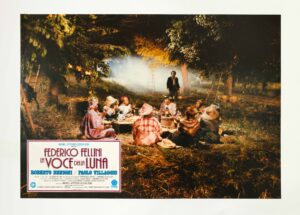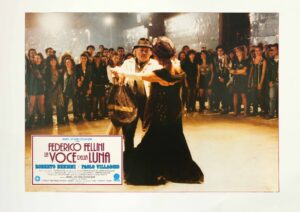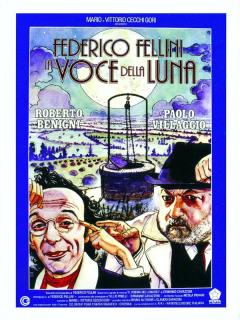La voce della luna
Year: 1990
Format: Colour
Runtime: 118 min
Production: Mario e Vittorio Cecchi Gori, per la C.G. Group Tiger Cinematografica e la Cinemax, con la collaborazione della Rai-Radiotelevisione italiana. Teatri di posa: Stabilimenti Cinematografici Pontini SpA
Word sales: Penta Distribuzione
Viewed censorship: 8539301/02/1990
Hinting at the lunar-obsessed lyrics of Italian poet Giacomo Leopardi, the tale focuses on Micheluzzi Brothers capturing the moon while Ivo – who’s just been dismissed from a mental hospital – tries to seduce Aldina Ferruzzi, the woman he’s in love with. Although she is not interested in him, Ivo equates her blond beauty with that of the moon, and thinks all his mental problems and frustrations are due to this. Meanwhile, the three madmen have caught the moon using gigantic farming equipment, and fastened it inside a stable using a rope. What ought to be a sacred event gives instead rise to a lot of confusion, and priests and politicians turn it into a political rally. The latter rapidly degenerates into violence, as a madman shoots the TV set, which bursts. Now Ivo is alone, and listens to the moon.



Crew
Director: Federico Fellini
Story: liberamente ispirato al romanzo “Il poema dei lunatici” di Ermanno Cavazzoni
Screenplay: Federico Fellini
Screenplay collaboration: Tullio Pinelli, Ermanno Cavazzoni
Cinematography: Tonino Delli Colli (Technicolor)
Colour processor: Carlo La Bella
Music: Nicola Piovani
Production design: Dante Ferretti
Costume design: Maurizio Millenotti
Wardrobe assistant: Alfonsina Lettieri, Carlo Poggioli
Film editing: Nino Baragli
First assistant director: Gianni Arduini
Second assistant director: Daniela Barbiani, Marco Polimeni
Camera operator: Marco Spelduti
Assistant camera: Massimo Intoppa, Roberto De Franceschi
Architecht: Massimo Razzi, Nazzareno Piana
Set decorator: Francesco Lo Schiavo
Choreography: Mirella Agujaro
Sound: Tommaso Quattrini
Edition: Lillo Capuano
Executive producer: Bruno Altissimi, Claudio Saraceni
Production manager: Roberto Mannoni
General manager: Pietro Notarianni, Maurizio Pastrovich
Production supervisor: Piero Spadoni, Nicola Mastrolilli
Cast
Roberto Benigni : Ivo Salvini
Paolo Villaggio : il prefetto Gonnella
Nadia Ottaviani : Aldina Ferruzzi
Marisa Tomasi : Marisa la vaporiera
Sim : l’oboista
Syusy Blady : la sorella di Aldina
Angelo Orlando : Nestore
Dario Ghirardi : il giornalista
Dominique Chevalier : il primo fratello Micheluzzi
Nigel Harris : Giuanin il secondo fratello Micheluzzi
Vito : terzo fratello Micheluzzi
Eraldo Turra : l’avvocato
Giordano Falzoni : il professore
Ferruccio Brembilla : il medico
Giovanni Javarone : il becchino
Lorose Keller : la duchessa
Patrizio Roversi : il figlio del prefetto Gonnella
Uta Schmidt : la nonna
Stefano Antonucci
Awards
1991
Silver Ribbon Best Score Also for In nome del popolo sovrano (1994), Il male oscuro (1990) and Il sole anche di notte (1990)
1989-1990
David Best Actor
David Best Production Design
David Best Editing
Peculiarites
“While I was playing with a little bit of earth, just some grains, and I passed them from one hand to the other as if my hands were a funnel, and I uttered a sound: ‘whuu’. I was a quiet child, and I easily enjoyed myself. At a given point, while I was playing, I felt a light wind blowing through my hair. Then I understood- but it’s hard to describe this feeling – I was firmly planted on the ground, and I had the impression my small legs were my roots. Dense and hot blood was being pumped inside my whole body. Blood was coming up to my head, and I heard the same sound (‘whuu’) I had uttered while I was playing. I felt exhilarated, light and powerful (powerful in the lower part, and light in the upper part of my body): I had been turned into a poplar! In La voce della luna I asked Benigni to tell us this story.”
(Federico Fellini, Imago. Appunti di un visionario, conversazione-intervista a cura di Toni Maraini, Semar, Roma, 1994, pp. 29-30)
Reviews
“Despite the calm melancholy of the film’s end and the need for silence (a sentence in which the lunar hero is Fellini’s spokesman), in my opinion La voce della luna is Fellini’s saddest film. This holds true not only because of its death-related themes (echoing Mastorna’s works that Fellini had studied for decades), but also because of madness (reference is made to ‘Le donne libere di Magliano’ by Tobino – a film he did not want to make or didn’t succeed in making), old age, loneliness, dismay. In La voce della luna Fellini also makes some sad comments on the vulgar and terrible period he is living in. The shots of “Gnocchi” (Dumplings’) Day and Miss Flour election are very eloquent. La voce della luna is a fairy tale fighting against background noise”.
(Morando Morandini, “Il Giorno”, 1 February 1990)
“Fellini’s very bitter fairy tale is based on an archetypal ‘village’ that is characterized both by unknown sweet traits and by the decay caused by prevailing consumerist attitudes. In a such a universe, only innocent Saturninus’ creativity can possibly lead to rediscovering man’s kindness, sincere and passionate love, and the ‘happy madmen’’ poetry. Other pure and simple characters are Salvini – who’s madly in love with foolish Aldina – and Gonnella who, after being denied any ‘power’, refuseseverything and everyone. Fellini is a great master and this film – despite all his surreal jokes and paradoxes – is still very tragic”.
(Sauro Borelli, “L’Unità”, 2 February 1990)
“La voce della luna is one of Federico Fellini’s most fascinating and poetic adventures, based on smiles and jokes, and a disillusioned, heartbreaking and worrying vision of the world we live in. Through legends, fairy tales and oddities, Fellini presents his endless universe of symbols, memories, inventions; without ever repeating himself, he hints at all his films. In this last masterpiece, however, Fellini filters every stylistic element, and proposes other original elements, thus unveiling his amazing imagination. We find a a kaleidoscope of characters in a story that is made up of bitter, sweet and merciless traits, humor and melancholy, exuberance and elegance, psychological dreams and a great variety of themes. La voce della luna is a magic, hilarious, surreal and grotesque fairytale. It describes today’s myths and rites (television, fast-food, discos…). It hints at yesterday’s dreams (‘Bassa Padana’ or lower Po river area, the friendly attitude of Emilia-Romagna region’s inhabitants, country fairs, the Gnocchi (dumplings)’ Day, Miss Flour, jokes … ). If you consider Amarcord as the village of memory, than you can say that La voce della luna gives us a shelter in our contemporary world”.
(Vittorio Spiga, “La Nazione”, 1 February 1990)


